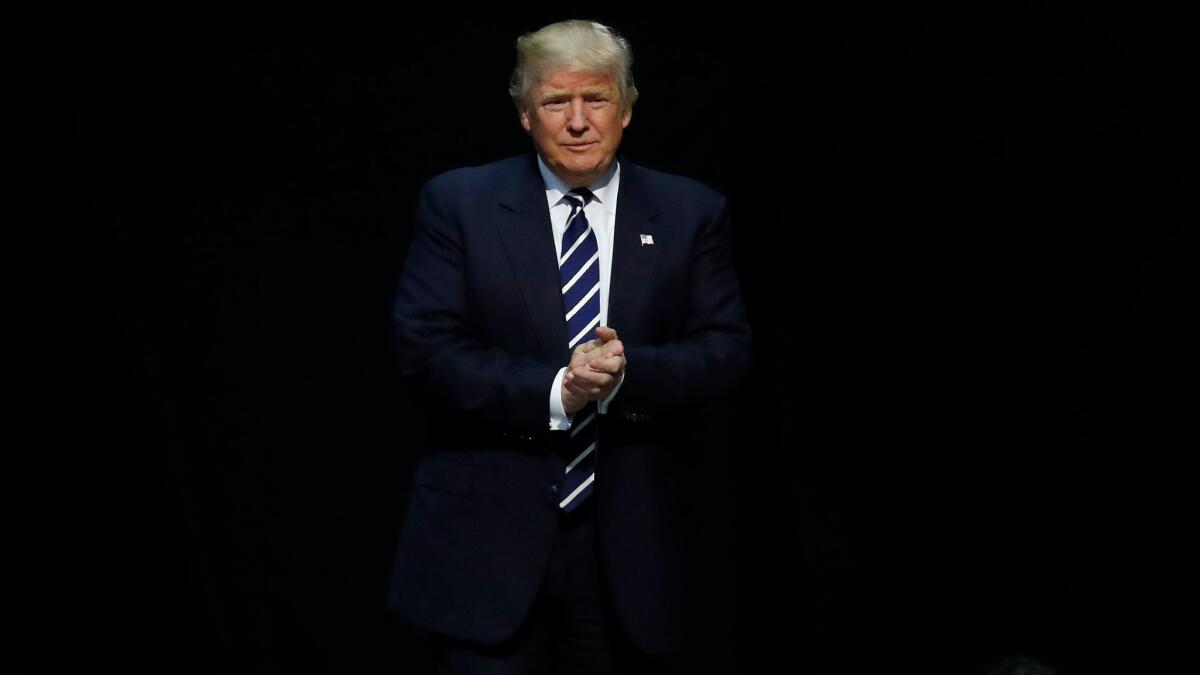Analysis: American voters wanted change in 2016, but will they get the change they wanted?

Reporting from Washington — Nothing about the 2016 presidential election was predictable — not the purloined emails, vulgar videotaped bragging, the insults flung every which way, or the riotous, raucous ascent of a reality television star as he defeated the first woman nominated by a major party for the presidency.
Debates over precisely what led to Donald Trump’s victory may continue for decades. Undeniable even now is that one factor played a huge role: A deep desire for change.
The question for 2017: Is the change Americans get the change they wanted?
As the new year approaches, mixed signals abound.
Take a look back at the politics year you’ll never forget »
Trump campaigned relentlessly on repealing his predecessor’s signature legislation, the Affordable Care Act. Mentions of his plan to tear it down beginning on his first day in office prompted explosive applause during his campaign rallies. Several of Trump’s early Cabinet picks are forcefully against Obamacare, reinforcing his intent to repeal.
But on Capitol Hill, the repeal is being fashioned by House Speaker Paul Ryan into a plan to cut benefits to Medicaid and Medicare recipients.
That unpopular proposal is something Trump opposed during the campaign; he suggested at one point that benefits should increase. The posture distinguished Trump from his Republican primary competitors and helped persuade historically Democratic voters — working class Americans who are often recipients of such aid — that Trump was in their corner. If that is the price of repeal, it’s not clear which path Trump will take.
His end game is similarly unclear when it comes to jobs.
2016 Year in Review: Highlights and heartbreaks »
Trump has heightened the theatrics over jobs during his pre-presidency — he engineered a public relations coup when, with the help of millions in taxpayer money and the threat of lost federal contracts, he helped persuade an Indiana-based air conditioning and heating company to spare several hundred jobs that otherwise would have gone to Mexico, a plan he emphatically opposed during the campaign.
But he ignored the company’s plans to send other jobs to Mexico, and he has yet to concoct a framework that could replicate his move across the entire country in any fiscally reasonable way. Will Trump by lauded for the jobs he saves, or impugned for the jobs he doesn’t?
Exit polls of voters casting November ballots demonstrated how Trump capitalized on change.
On Election Day, exit polls showed, 62% felt the country was on the wrong track. Of those voters, 68% voted for Trump and only 26% for Clinton. Asked what candidate quality mattered most, 39% of voters said the ability to create change, a figure nearly twice as important as its nearest competitor. Trump won more than four in five of those voters.
The change set in motion on Nov. 8 will reverse the direction the United States has been traveling for the last eight years. The leftward push of President Obama will be followed by the rightward push of President Trump, the new driver climbing aboard the big rambling vehicle that is America and pulling a swift and definitive U-turn.
The caution for Trump is this: Change is easier to promise than to accomplish. One is a hypothetical compilation of dreams; the other is real life, buffeted by competing constituencies and complicated circumstances.
Trump is aiming for success. If he fails to accomplish it, the desire for change that fueled his unlikely rise may be visited upon him in four more years.
Twitter: @cathleendecker
More to Read
Get the L.A. Times Politics newsletter
Deeply reported insights into legislation, politics and policy from Sacramento, Washington and beyond. In your inbox three times per week.
You may occasionally receive promotional content from the Los Angeles Times.











